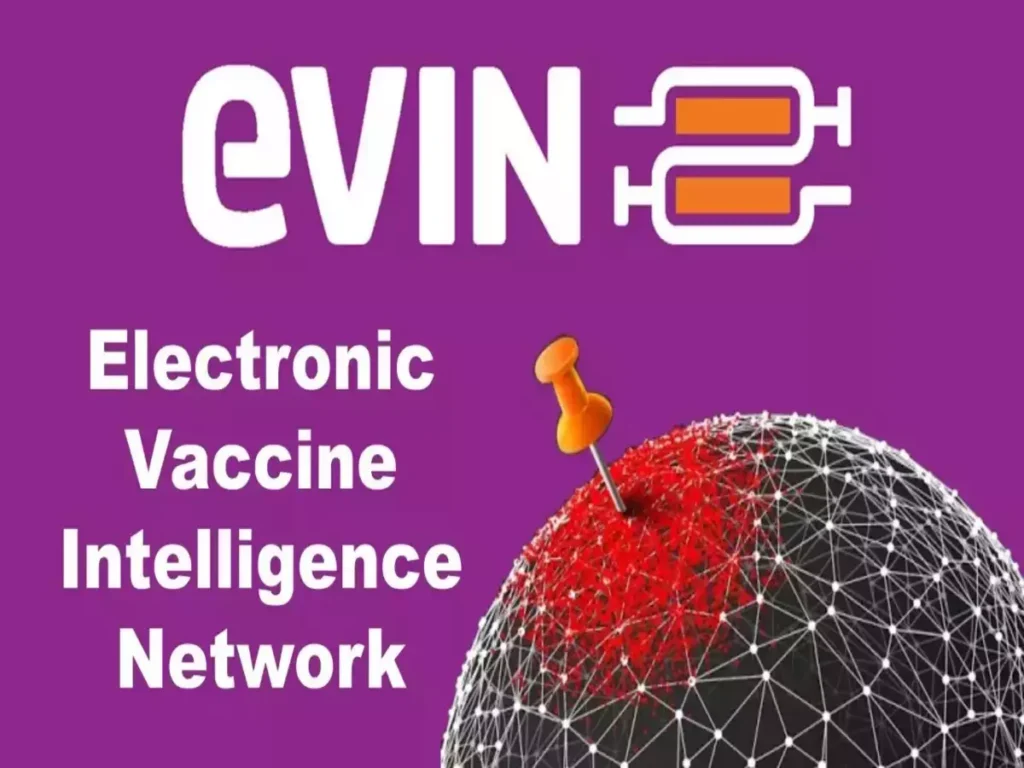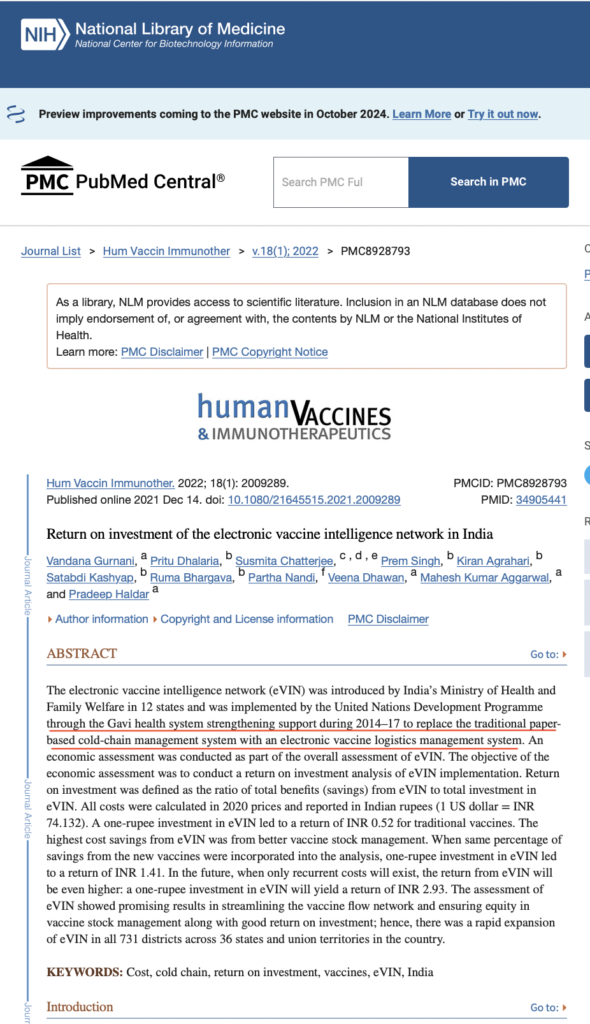The Story of CoWIN: How A Vaccination Strategy for Digital India Failed
Why was a wholly digital platform like CoWIN—one that is largely accessible to the technology-owning elite—used for something as essential as mass vaccine registration?

The electronic vaccine intelligence network (eVIN) was introduced by India’s Ministry of Health and Family Welfare in 12 states and was implemented by the United Nations Development Programme through the Gavi health system strengthening support during 2014–17 to replace the traditional paper-based cold-chain management system with an electronic vaccine logistics management system

What is U-WIN?
U-WIN is a digital platform designed to manage the entire vaccination process, from appointment scheduling to record-keeping. Developed by a consortium of tech giants, including Microsoft and Google, with the backing of philanthropic organizations like the Bill & Melinda Gates Foundation.
Understanding India’s U-WIN Program Digitizes Universal Immunisation Programme – 2024
• The U-WIN program, a replica of the Co-WIN platform, has been launched in a pilot mode in 65 districts.
• The platform will register and vaccinate every pregnant woman, record her delivery outcome, register every newborn delivery, administer birth doses, and all subsequent vaccination events.
• The U-WIN will be the single source of information for immunisation services, updating vaccination status, delivery outcome, planning of RI sessions, and reports like antigen-wise coverage.
• Digital registrations of all pregnant women and newborns will be used for individualized tracking for vaccination, reminders for upcoming doses, and follow-up of dropouts.
• Real-time data of routine immunisation sessions and vaccination coverage will be generated for better planning and vaccine distribution.
• Citizens can check nearby ongoing routine immunisation sessions and book appointments through the platform.
• All states and UTs have been sensitised on U-WIN functionalities and objectives for the pilot in 65 districts.
• The digitisation of the entire vaccination system will ease tracking of beneficiaries, enable session planning, and update vaccination status on a real-time basis.
How Does CoWIN Affect People’s Privacy?
Getting back to Davos, Gates said this about the new era of vaccines that are coming soon. Gates said that “COVID vaccines need to have longer duration, more coverage, and we’re going to change. Instead of using needles, we’ll use a little patch.” That ‘patch’ is the human implantable quantum dot microneedle vaccine delivery system we warned about 4 years ago. Not only that, Bill Gates went on to say that India would be the place where this ‘innovation’ would be rolled out from. Why India? Glad you asked!
When Bill Gates says he has a new vaccine ‘patch’, he is actually talking about his human implantable quantum dot microneedle vaccine delivery system, and it will be powered by AI #BillGates #Davos #MarkOfTheBeast #VaccineGenocide pic.twitter.com/DRxSHkDz9O
— Now The End Begins (@NowTheEndBegins) January 17, 2024
In January 2021, several WEF partners, including Bill Gates and Microsoft, Oracle, Salesforce, and several other “heavyweights,” announced a partnership to launch the Vaccine Credential Initiative (VCI) to develop digital immunization authentication tools, according to Forbes. Aiming to institute a single “SMART Health Card” for the world, the VCI intends for its SMART Health Cards to be recognized “across organizational and jurisdictional boundaries.” The entire operation runs on the Aadhaar biometric digital ID program [1]. Now you know why India has been selected.
[1] https://www.nowtheendbegins.com/bill-gates-global-digital-id-biometric-identification-mark-of-the-beast-covid-immunity-passport/Gates made his remarks to the invitation-only Technology, Entertainment and Design 2010 Conference in Long Beach, Calif. His February address was titled “Innovating to Zero!”
He presented a speech on global warming, stating that CO2 emissions must be reduced to zero by 2050. Gates said every person on the planet puts out an average of about five tons of CO2 per year.
“Somehow we have to make changes that will bring that down to zero,” he said. “It’s been constantly going up. It’s only various economic changes that have even flattened it at all. So we have to go from rapidly rising to falling, and falling all the way to zero.”
Bill Gates presented the following equation: CO2 (total population emitted CO2 per year) = P (people) x S (services per person) x E (average energy per service) x C (average CO2 emitted per unit of energy)
“Let’s look at each one of these and see how we can get this down to zero,” he said. “Probably one of these numbers is going to have to get pretty near to zero. That’s a fact from high school algebra.”
Discussing the “P,” or population portion of the equation, he stated, “Let’s take a look. First we got population. The world today has 6.8 billion people. That’s headed up to about 9 billion. Now if we do a really great job on new vaccines, health care, reproductive health services, we could lower that by perhaps 10 or 15 percent” [emphasis added].
Further, he said it would not be hard to keep track of children [a], the vaccines they’ve had and when they’re due for another.
He said cell phone technology could be used to register every birth around the globe and track children to make sure they have been vaccinated as government advisers urge.
The massive effort was discussed by Bill Gates at a mHealth Summit [b], which delved into the issues of technology and health. According to Natural News [c], Gates told the conference that the goal is a lower population, and using vaccines to improve early childhood health is a step in that direction. “That sounds paradoxical,” he said. “The fact is that within a decade of improving health outcomes, parents decide to have [fewer] children.”
“If you could register every birth on the cell phone, get fingerprints, get a location, then you could take the systems where you go around and make sure the immunizations happen,” he said. “Run them in a more effective way.”
WND also reported in May 2009 [d] when Bill Gates joined some of the richest men and women in the world meeting secretly in New York to talk about using their vast wealth to bring the world’s population growth under control.
[d] http://www.wnd.com/index.php?fa=PAGE.view&pageId=99105Electronic Vaccine Intelligence Network (eVIN)
The Electronic Vaccine Intelligence Network (eVIN) is an indigenously developed system that digitizes records of vaccine stocks and monitors its temperature through a smartphone application
eVIN will support the government’s Universal Immunization Programme [e] by providing real-time information on vaccine stocks and storage across all the cold chain points in all the states it’s being implemented in.
[e] https://byjus.com/free-ias-prep/boost-for-immunisation-drive-in-india/*Note: The government has created CoWIN (Covid-19 Vaccine Intelligence Network) which is a repurposed version of eVIN (Electronic Vaccine Intelligence Network). The goal is to ensure last-mile delivery of Covid vaccine following launch of the world’s largest vaccination drive in January 16.
The information regarding eVIN will be useful for candidates appearing for their Government Exams [f].
[f] https://byjus.com/govt-exams/How will eVIN work?
Those who handle cold storage units will be provided with a smartphone with the eVIN application installed. An inventory of the vaccines available will be made routinely upon utilization at the end of every immunization day. This will provide data on the number of vaccines used and how much is left. The data entered will by simultaneous uploaded on a cloud server which can be viewed by the managers of the programme at district, state and national level through online dashboards.
To know more about other Government Schemes [g], visit the linked article
[g] https://byjus.com/govt-exams/government-schemes/The data included will provide real-time information on vaccine stocks and storage temperature of the vaccines. Temperature data is recorded every ten minutes through a digital sensor placed in the refrigerator. and updated at an interval of sixty minutes on the server via General Packet Radio Service (GPRS). In case of temperature breach, the logger alarms and sends email and SMS alerts to responsible cold chain technicians and managers.
By streamlining the vaccine flow network, eVIN is a powerful contribution to strengthening health systems and ensures equity through easy and timely availability of vaccines to anyone who requires it.
Additionally, the Electronic Vaccine Intelligence Network combines the following solutions:
Technology: eVIN will facilitate evidence-based decision-making by making available online real-time information on vaccine stocks and storage temperature
Governance: The program will ensure efficient vaccine logistics management by systemizing record-keeping through standardizing stock and distribution registers; identifying gaps and improving clarity on vaccine cold chain network
Human Resources: The state cold chain network will be empowered by building the capacities of government cold chain handlers and deploying vaccine and cold chain managers in every district for constant support to estimate vaccine requirements.
Questions related to the Electronic Vaccine Intelligence Network
In which Indian states eVIN has been implemented?
Beginning in October 2015, eVIN has been rolled out in 371 districts of Assam, Bihar, Chhattisgarh, Gujarat, Himachal Pradesh, Jharkhand, Madhya Pradesh, Manipur, Nagaland, Odisha, Rajasthan and Uttar Pradesh.
How many cold storage units for vaccines are present in India?
The eVIN programme is being implemented across 27,000 cold storage units across India.
How will the eVIN programme help in fighting the COVID-19 pandemic?
The eVIN programme will help in making a COVID vaccine easily available in the event of its creation. It will also boost India’s health programme by making any and all vaccines easily available to vulnerable groups such as children, older people etc.
Why Was the CoWIN Model Chosen?
The discussions [h] regarding the development of what would eventually be the CoWIN platform began in mid-2020, when COVID-19 cases were peaking during the country’s first wave.
[h] https://the-ken.com/story/building-and-breaking-of-cowin/?searchTerm=cowinThe specific decision to use a digital platform to register Indians for inoculation aligns with the government’s Digital India [i] mission. Over the last year, the initial idea for the platform that eventually became CoWIN has been heavily influenced by Nandan Nilekani [j], the chairman of UIDAI and former chairman of Infosys. The larger use of the Aadhaar card as a unique identifier in Digital India—which propelled landmark privacy judgements [k] by the Supreme Court in 2018—was also interestingly the brainchild of Nilekani [l].
[i] https://www.digitalindia.gov.in/ [j] https://indianexpress.com/article/india/nandan-nilekani-coronavirus-vaccine-tracker-health-sector-economy-6779867/ [k] https://www.scobserver.in/court-case/constitutionality-of-aadhaar-act [l] https://www.forbesindia.com/article/big-bet/how-nandan-nilekani-took-aadhaar-past-the-tipping-point/36259/1With building an integrated platform- #NDHM, the digital delivery of health services will become a possibility, revolutionising healthcare in India, says @rssharma3. He addressed the plans in place to make the #CoWIN app more user-friendly. @ET_Government https://t.co/dBv4C6Xfyk
— National Health Authority (NHA) (@AyushmanNHA) June 11, 2021
Once a digital platform had been decided on, then came the question of how to build and design it. The Ministry of Health and Family Welfare (MoHFW) had an existing vaccination distribution system that could be used: eVin, or the electronic vaccine intelligence network. Pre-pandemic, eVin was used to inoculate mothers and children across the country under the National Health Mission [m]. The network was jointly funded by Gavi (the Vaccine Alliance) and the United Nations Development Program (UNDP).
[m] https://ndhm.gov.in/Initially, the MoHFW sought to develop eVin, such that it suited and fulfilled current demands for COVID-19 vaccination, with added features of user authentication and vaccine delivery modules. However, the UNDP’s contract with the company that originally developed the tool expired in October of 2020 [n]. To avoid hassles related to contracts, the Ministry delegated the work of managing the logistics of developing CoWIN to the UNDP, which according to The Ken, outsourced some of this work to Mumbai-based Trigyn Technologies [o].
[n] https://procurement-notices.undp.org/view_file.cfm?doc_id=228564 [o] https://www.trigyn.com/In spite of these shifts while developing the technology behind CoWIN, the government was continuously involved in some capacity—yet, even then, it failed to take into account the long term issues of a digitised vaccine drive in ‘Digital India’.
Source: Now The End Begins, The Bastion, Telegraphindia, Qvive, ET Government-Image, Wikipedia
Also Read:
